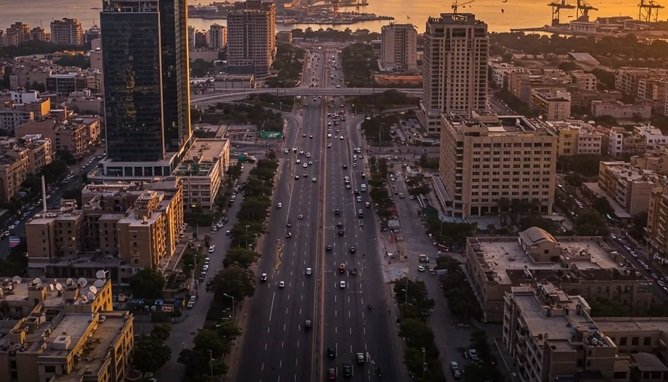In a significant step toward sustainable urban development, Karachi is gearing up for major climate resilience initiatives with strong collaboration between the federal and Sindh governments. During a high-level meeting at the Sindh Investment Department, Federal Minister for Maritime Affairs Chaudhry and Syed Qasim Naveed Qamar, Sindh’s Special Assistant on Public-Private Partnership, unveiled plans to modernize Karachi’s infrastructure with a climate-conscious approach.
Elevated Road to Ease Congestion and Protect Ecosystems
The cornerstone of this initiative is a proposal to construct a 15-kilometer elevated road from Karachi Port Trust to Mai Kolachi. This elevated route is designed to ease one of the city’s most pressing problems—chronic traffic congestion—while promoting sustainable urban mobility. It will provide a smoother transport corridor for freight and daily commuters, especially between the port and the city center.
Significantly, the road project aims to reduce illegal encroachments along existing routes and protect the city’s critical mangrove forests, which are essential for coastal defense, biodiversity, and flood mitigation. Mangroves act as natural barriers against rising sea levels and storm surges—key concerns for Karachi as climate change intensifies.
Eco-Friendly Urban Development and Trade Facilitation
Federal Minister Chaudhry emphasized that an efficient port-to-city transportation system is not only crucial for Karachi’s maritime trade but also a vital component of climate-smart infrastructure. “Better port-to-city roads will help economic growth and cut pollution. It’s vital for sustainable development,” he noted, urging swift action on the proposed projects.
This integrated approach aligns infrastructure growth with environmental protection, aiming to balance economic expansion with ecological sustainability. The federal and provincial governments have pledged to implement the projects with transparency, urgency, and cooperation.
Boosting Climate Resilience and Economic Growth
Karachi, as Pakistan’s largest city and economic hub, faces growing challenges from climate vulnerability, including flooding, heatwaves, and rising sea levels. These new infrastructure investments are expected to make the city more resilient to climate risks, improve public services, and stimulate economic activity through enhanced connectivity.
With plans now in motion, authorities are hopeful that Karachi will emerge as a model for climate-resilient urban development—one that can accommodate future growth while preserving its delicate coastal environment.






